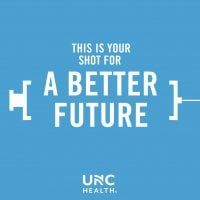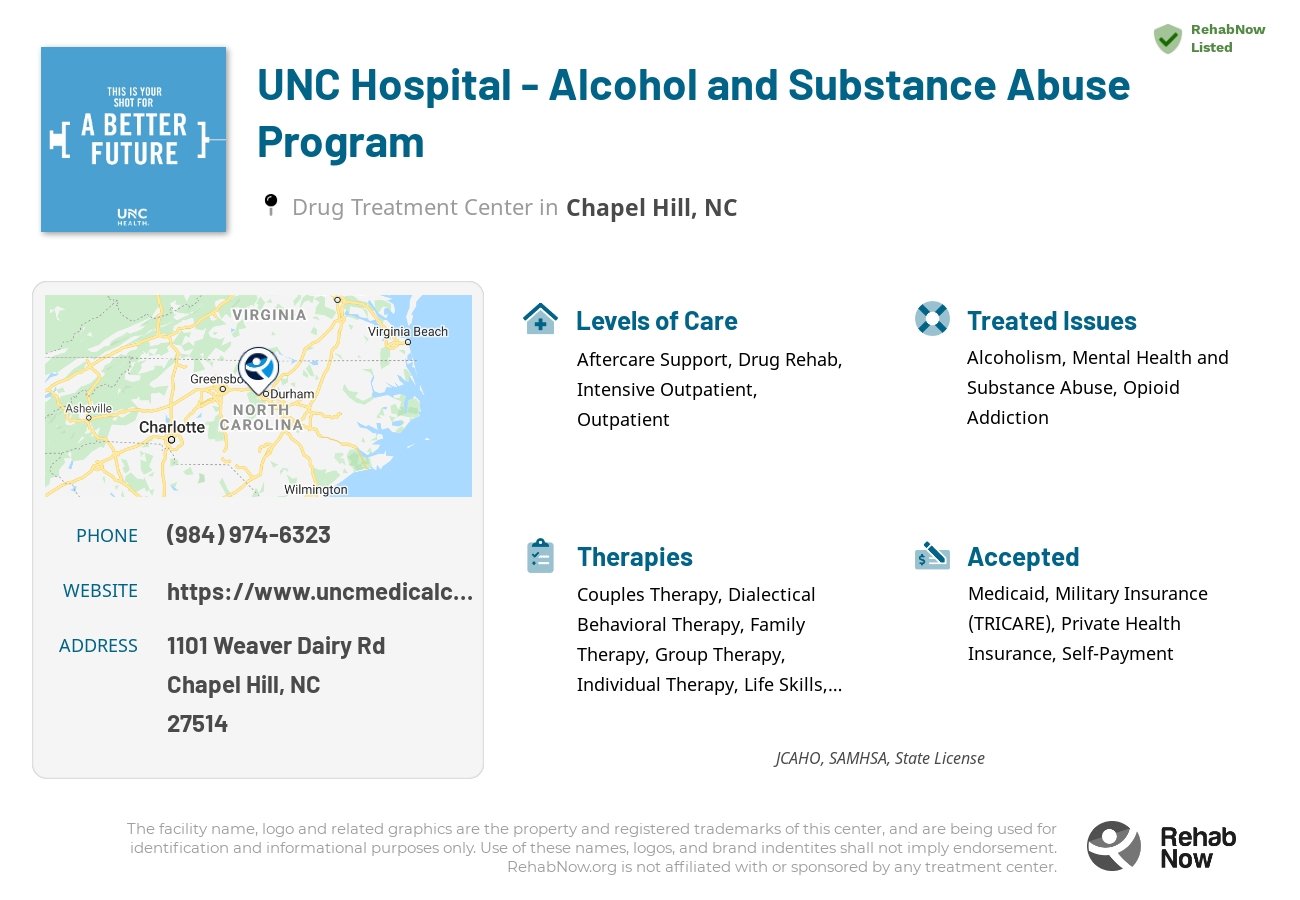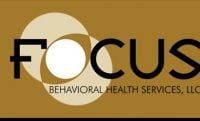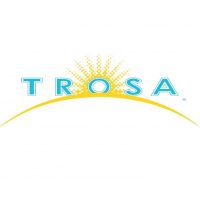UNC Hospital - Alcohol and Substance Abuse Program
Drug Rehab Center in Chapel Hill, North Carolina
The UNC Hospital Alcohol and Substance Abuse Program provides a comprehensive, accredited program for individuals seeking sobriety, offering detoxification, intensive outpatient, and dual-diagnosis services as well as personalized aftercare.
About This Chapel Hill, NC Facility
UNC Hospital – Alcohol and Substance Abuse Program in Chapel Hill, North Carolina, addresses a comprehensive range of issues related to alcoholism, drug addiction, and co-occurring mental health conditions. Distinctively, the program combines a variety of evidence-based treatment models personalized to meet the unique needs of each individual, ensuring a supportive journey towards recovery.
Accredited by prestigious organizations like CARF, JCAHO, SAMHSA, and holding a State License, the program is recognized for its high standards in offering aftercare support, detoxification, and dual-diagnosis treatments among others. Professional therapists tailor specific plans for patients, facilitating a focused and effective path to sobriety.
- Personalized Treatment Plans: Every patient benefits from a custom-tailored treatment plan, emphasizing the program's commitment to addressing individual needs.
- Comprehensive Care: From medical detoxification to mental health services and aftercare, the program offers an all-encompassing approach to recovery.
- Evidence-Based Practices: Utilizing a range of proven treatments, such as Cognitive Behavioral Therapy and Motivational Interviewing, the program focuses on cutting-edge methods to support recovery.
Specializing in the treatment of alcoholism, drug addiction, and opioid addiction, the UNC Hospital Alcohol and Substance Abuse Program employs a variety of methods including individual and group therapy, intensive outpatient, and long-term residential care to address these issues effectively.
Genders
Ages
Modality
Additional
Accreditations
State License
SAMHSA

JCAHO

CARF
The Commission on Accreditation of Rehabilitation Facilities (CARF) is a non-profit organization that specifically accredits rehab organizations. Founded in 1966, CARF's, mission is to help service providers like rehab facilities maintain high standards of care.
Conditions and Issues Treated
Substance abuse refers to the intensive and inappropriate use of psychoactive substances. Psychoactive substances are those that affect brain function. These include illegal drugs, alcohol, and even the excessive use of prescription drugs. The overuse of psychoactive substances leads to severe physical or psychological dependence. It also affects the social life and relationships of the affected individual. Substance abuse is treatable.
The duration of treatment at UNC Hospital - Alcohol and Substance Abuse Program in Chapel Hill can require weeks or even months depending on the severity of the condition as there is a risk of relapse. Treatment options include medications, counseling sessions, various types of behavioral therapy, and group therapy in different combinations.
Addiction to prescription opioid painkillers like oxycodone and hydrocodone, and illicit opioids such as heroin, leads to potentially life-threatening withdrawal symptoms when discontinued. Opioid addiction treatment typically involves an inpatient stay at facilities like UNC Hospital - Alcohol and Substance Abuse Program to make sure they get through withdrawal safely. Treatment also includes comprehensive mental health counseling.
Conditions such as anxiety, depression, schizophrenia, bipolar disorder are part of mental illness. This may occur that opioid abuse and vice versa are induced by mental illness. Diagnosing a concurrent diagnosis or co-occurring condition at UNC Hospital - Alcohol and Substance Abuse Program is essential to understand the addiction better.
Levels of Care Offered
This center offers a variety of custom treatment tailored to individual recovery. Currently available are Aftercare Support, Detox, Drug Rehab, Dual-Diagnosis, Intensive Outpatient, Outpatient, with additional therapies available as listed below.
Detox is the primary substance abuse treatment administered to a patient suffering from drug addiction. Detox helps patients in Chapel Hill, NC recover from drug-addicted through regular monitoring of medical professionals and temporary utilization medication, other techniques.
If you or someone you know suffers from a substance abuse problem, it is crucial to understand the different options available for treatment and seek help as early as possible. These days, detox centers offer several methods for drug and alcohol addiction rehabilitation and treatment.
An intensive outpatient program is a good option for someone in North Carolina with a milder or less severe addiction. An IOP may involve daily meetings at a treatment facility, along with personal counseling and peer meetings. Some IOP programs offer half-day treatment, while others offer full-day programs. UNC Hospital - Alcohol and Substance Abuse Program‘s IOP is customized per individual.
Outpatient programs are the standard for addiction treatment. About 9 in 10 U.S. adolescents entering addiction treatment enroll in these programs, so you’re not alone in Chapel Hill, NC. Treatment is delivered in different settings – offices, clinics, and primary care clinics.
Facilities offer a variety of services, such as individual and group counseling and family therapy. During the sessions, you work with a team of experts that include: General physicians, Psychiatrists, Social Workers, and Psychologists. The main goals of outpatient recovery programs are to help addicted individuals reduce drug use and addictive behaviors, eventually becoming entirely sober.
Aftercare comprises services that help recovering addicts readjust to normal day-to-day North Carolina activities. It can last a year or even longer. Services include individual and family counseling, medications to reduce cravings, and treatment of psychiatric and other medical conditions. Aftercare support begins once you have completed earlier stages of treatment.
UNC Hospital - Alcohol and Substance Abuse Program‘s Therapies & Programs
In addiction recovery at UNC Hospital - Alcohol and Substance Abuse Program, therapy plays a significant role. This helps patients get to the root of their addiction and discover how the problems that contributed to their use can be handled better. Therapy can be performed in a group and one on one settings. The patient interacts with the therapist in a one-on-one atmosphere during individual therapy. This encourages them to reflect on the underlying addiction problems and develop ways to avoid potential future abuse.
Recovering from addiction involves recovering relationships as well. One of the most common areas of stress and damage during addiction is in intimate relationships. Couples therapy at UNC Hospital - Alcohol and Substance Abuse Program can rebuild trust and joy that may have been damaged. Addiction involves everyone in the family, not only the addict.
Family roles can change in damaging ways that may require professional help to rebalance. Successful intimate relationships can decrease the chances for relapse by ensuring a healthy environment after rehab in Chapel Hill, NC.
Addiction and alcoholism affect the entire family. For this reason, family therapy is vital to a person’s recovery from addiction. In contrast to couples counseling, family therapy at UNC Hospital - Alcohol and Substance Abuse Program may include siblings, children, parents, and other significant people in the recovering person’s life. Family support is one of the most important pillars of recovery.
Many people turn to drugs and alcohol as a way of processing trauma that has affected them in the past. Trauma can include abuse, neglect, the loss of a loved one and other unpleasant incidents. Trauma therapy at UNC Hospital - Alcohol and Substance Abuse Program helps patients process trauma. It gives them the tools to deal with it in a healthier manner.
Dialectical behavioral therapy (DBT) is a type of Cognitive Behavioral Therapy that focuses on eliminating specific negative thoughts such as suicidal thoughts that can potentially lead to an individual inflicting self-harm. It is useful in the treatment of patients exhibiting uncontrollable emotions, intense mood swings, and borderline personality disorders.
The term “Dialectic” means the integration of opposites. In the substance abuse context, DBT refers to accepting the patient’s addiction and working to change their thoughts and behavior. It improves life skills such as controlling the intense emotions without reacting impulsively, resolving the interpersonal conflicts effectively, and promoting awareness about self and others.
Cognitive Behavioral Therapy (CBT) examines the relationship between a patient’s thoughts, feelings and behaviors. UNC Hospital - Alcohol and Substance Abuse Program aims to establish a healthy response to thoughts and feelings as an alternative to turning to drugs and alcohol. It also promotes healthy communication between addicts and those around them. It is and effective therapy for people suffering with all types of addictions.
Life skills pertain to the skill sets a person should possess to become successful in life. Examples are time management, budgeting, and social abilities. Life skills therapy highlights the fact that addiction recovery is more than just a person’s ability to go through their day-to-day without resorting to substance use in Chapel Hill, NC once they leave the facility.
The recovery technique used by Alcoholics Anonymous is the 12 step program, but it can relate to any form of addiction. The 12 steps that addicts must take on the road to recovery are explained. Measures include acknowledging that you have a problem and agreeing to turn around your life. The curriculum, instructed by UNC Hospital - Alcohol and Substance Abuse Program, also requires a belief in a greater power and making amends to others.
It’s no surprise that diet is a crucial player in one’s well-being. What an individual puts into his or her body becomes the fuel that drives the mental and physical faculties to perform accordingly. Therefore, nutrition therapy, also known as medical nutrition therapy (MNT), guarantees that an individual is providing his or her mind and body with proper nourishment.
The right diet can improve a person’s general outlook, sleep habits, and thought processing skills. MNT also lowers the occurrence of chronic diseases such as adult-onset diabetes. Dieticians at UNC Hospital - Alcohol and Substance Abuse Program in Chapel Hill, North Carolina believe that nutrition therapy is the key to making significant lifestyle changes, especially when it comes to personal care.Nicotine Replacement Therapy (NRTC) used products like skin patches and gum to deliver nicotine into the bloodstream of people trying to quit smoking. This helps break the habits associated with smoking. The very low doses of nicotine managed by UNC Hospital - Alcohol and Substance Abuse Program prevent cravings while helping people make a gradual transition to complete smoking cessation.
Patient Experience
Experiential Therapy at UNC Hospital - Alcohol and Substance Abuse Program
Experential therapy is a unique type of therapy that deals with the subconscious mind. This treatment available at UNC Hospital - Alcohol and Substance Abuse Program in Chapel Hill, NC encourages individuals to work out their issues with their inner self through synchronous experiences.
This non-traditional treatment method makes use of the physique and encourages people to take part in various physical and emotional activities, movements, and practices. Some of the most common examples of experiential therapy are equine therapy, music therapy, adventure therapy, and role playing. Through these various methods, an individual is believed to heal from trauma, negative emotions, and hurtful memories faster. Moreover, experiential therapy is known to have enduring results which can be beneficial to sufferers.
Payment Options Accepted
For specific insurance or payment methods please contact us.
Is your insurance accepted?
Ask an expert, call (888) 674-0062
Additional Details
Specifics, location, and helpful extra information.
Chapel Hill, North Carolina 27514 Phone Number(984) 974-6323 Meta DetailsUpdated April 15, 2024
Staff Verified
Patient Reviews
There are no reviews yet. Be the first one to write one.
Chapel Hill, North Carolina Addiction Information
North Carolina ranks 29th in the nation for overall substance abuse. Many of the drugs abused in the state are illicit, and many of these are opioids. Prescription opioids are readily available due to the high rates of medical workers prescribing them. The number of prescriptions has increased tenfold since the 1980's. Opioid overdoses are the most common type of death in North Carolina.
The number of people addicted to drugs or abusing drugs is on the rise in Chapel Hill, North Carolina. Cocaine is the most commonly used drug, with an estimated 8.3% of people using it. Marijuana is the second most common drug and has an estimated 7.2% of users. Some of the biggest problems caused by drug addiction and abuse are crime and violence.
Treatment in Nearby Cities
- Thomasville, NC (57.9 mi.)
- Bryson City, NC (249.5 mi.)
- Norlina, NC (58.2 mi.)
- Newport, NC (148.1 mi.)
- Danbury, NC (71.3 mi.)
Centers near UNC Hospital - Alcohol and Substance Abuse Program
The facility name, logo and brand are the property and registered trademarks of UNC Hospital - Alcohol and Substance Abuse Program, and are being used for identification and informational purposes only. Use of these names, logos and brands shall not imply endorsement. RehabNow.org is not affiliated with or sponsored by UNC Hospital - Alcohol and Substance Abuse Program.












